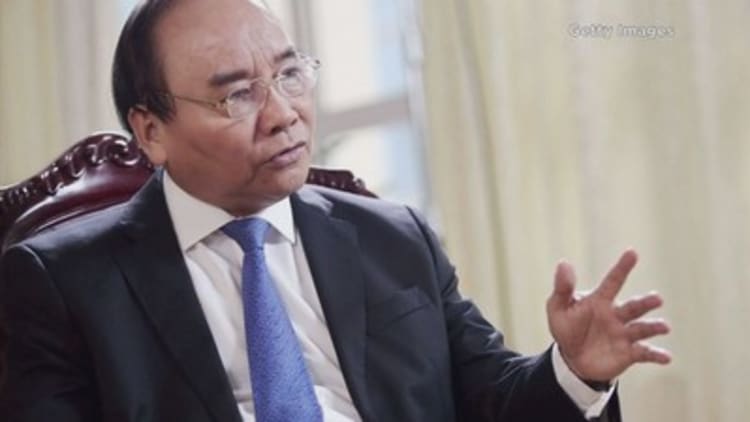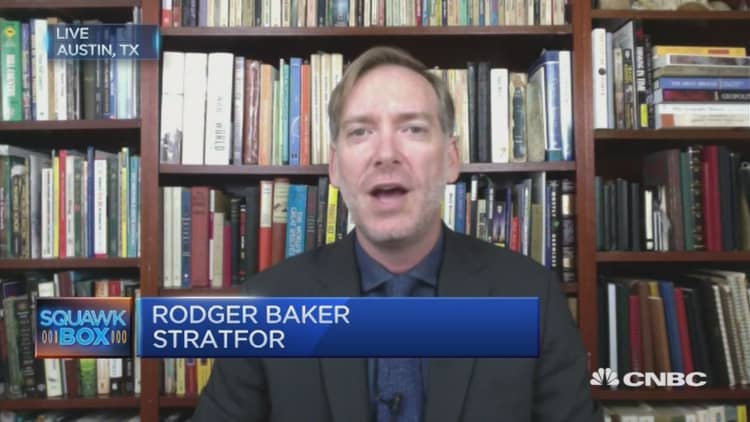
Hanoi could emerge as a key player in Washington's long-term Southeast Asia push that's aimed at neutralizing Beijing's influence in the South China Sea.
On Wednesday, Vietnamese Prime Minister Nguyen Xuan Phuc will be the first ASEAN leader to visit the White House since President Donald Trump's election and the U.S. may look to tap into the emerging market's friction with China.
"Vietnam sits in a very interesting position in Southeast Asia," said Rodger Baker, vice president of strategic analysis at geopolitical intelligence firm Stratfor. Because Hanoi maintains a strong position against Beijing's activities in the South China Sea, Trump may eye Vietnam as a potential counter to China in the disputed area, Baker explained.
The world's second-largest economy claims 90 percent of the sea, home to over 250 islands and rich natural gas reserves, while Vietnam, Brunei, Malaysia, the Philippines and Taiwan assert ownership of certain parts. And as Beijing ramps up island-building and military construction in the maritime region — reports recently emerged of Chinese rocket launchers in the Spratly Islands — Hanoi has not shied away from publicly denouncing the mainland.
In 2014, Vietnam witnessed violent protests as demonstrators criticized China's assertiveness in the important waterway while Vietnamese officials lambasted Beijing in March after a Chinese cruise ship visited the Paracel Islands, which are claimed by both countries.
China's territorial expansion has also irked Washington, with Trump promising vowing to halt Beijing's construction of artificial islands days after taking office. And while the president's hands are currently tied as he seeks the mainland's help on reigning in a hostile North Korea, the South China Sea issue still looms large — last week, the Chinese navy deployed two missile frigates to a U.S. Navy warship that sailed near the China-claimed Spratly Islands.
The Vietnamese PM's visit to Washington "adds momentum to a U.S.-Vietnam relationship that is moving in an increasingly strategic direction," Jonathan Stromseth, senior fellow at Brookings, described in a recent note.

Indeed, the two allies have already initiated a series of bilateral military exchanges that could raise eyebrows in Beijing.
"Within the past week or so, Washington has delivered small vessels to the Vietnamese coast guard, there have been naval exchange visits (and) the U.S. has also waived some restrictions on arms exports to Vietnam," said Baker, adding that he expected this type of military cooperation to continue.
Of course, Vietnam isn't Trump's sole ASEAN ally in the maritime conflict.
The White House has been visibly cozying up to several Southeast Asian nations "in the context of rising Chinese influence and growing concerns about the U.S. staying power in the region, particularly after (Washington's) withdrawal from the Trans-Pacific Partnership," Stromseth explained.
Over the past month, Vice President Mike Pence has visited Indonesia, Trump has telephoned several ASEAN leaders, including controversial Philippine President Rodrigo Duterte, while Secretary of State Rex Tillerson has hosted ASEAN foreign ministers in Washington.
The White House's demonstrated commitment to the region could "foster conditions that enable constructive multilateral engagement with China in the Asia-Pacific, helping to mitigate strategic rivalry between Washington and Beijing over the long term," Stromseth said.

